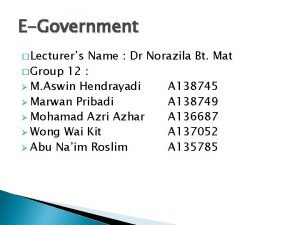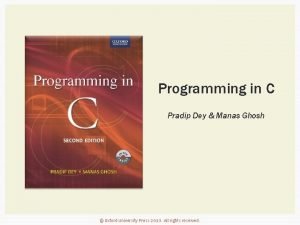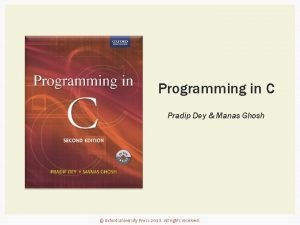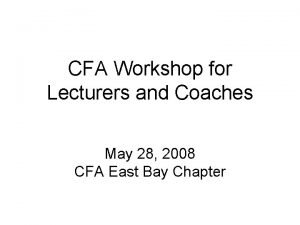Sree Pradip Chandra Das Lecturer in English Ziarkandi






















- Slides: 22

Sree Pradip Chandra Das Lecturer in English Ziarkandi Hafij Uddin Fazil Madrasah Gouripur Titas, Cumilla I D E N T I T Y Class: 1 X-X Subj: English 2 nd Paper Time: 45 minutes Date: October 24, 2021 Class: XI-XII Subj: English 1 st Paper Time: 45 minutes Date: October 24, 2021 10/24/2021 1

Read the sentences below-- Karim: You are happy, I think, aren’t you? Selim: Yes, I am. What does the phrase “aren’t you? ” express and why is it used ?

Can you guess what may be the topic today? Tag Question

Learning Outcomes: After the lesson the ss will be able to→ use question tag in conversation. → say the rules of question tag.

Kinds of Tag Questions There are two kinds of tag questions: 1. Question tag. 2. Comment tag. Today we will learn “Question Tag”

Detail form Contracted form am not is not aren’t isn’t aren’t Detail form has not have not had not wasn’t weren’t does not will not shall not can not won’t shan’t did not ought not can’t could not may not might not must not couldn’t mayn’t mightn’t mustn’t. dare not need not **** was not were not do not **** Contracted form hasn’t haven’t hadn’t doesn’t didn’t oughtn’t daren’t needn’t ****

See the examples 1. You have known Meena, haven’t you? 2. She can help you, _______? 3. They are dancing, _______ ? Rule/Comment If the statement is affirmative, the tag question will be negative. 2. can; t she? 3. aren’t they?

See more examples 1. The fan is not working, is it? ? 2. They will not go home, _______? 3. She is not interested to do it, _______? Rule/Comment If the statement is negative, the tag question will be affirmative. 2. will they? 3. is she?

See more examples 1. Karim is not working, is he? 2. Rebeka will not go home, ____? 3. Selina is not playing, ____? Rule/Comment If the subject of the statement is noun we have to take pronoun in the tag question. 2. will she? 3. is she?

See more examples 1. She is pretty, isn’t she? 2. I have done the work, ____? 3. We are going to start a business, _______? Rule/Comment If the statement contains an auxiliary verb than the auxiliary verb is repeated in the tag question. 2. haven’t I? 3. aren’t we?

See more examples 1. They play football in the field, don’t they? 2. She goes to school, _____? 3. I went to Dhaka yesterday, ____? Rule/Comment If the statement does not use any auxiliary verb then we have to take do, does, did as an auxiliary verb. 2. doesn’t she? 3. didn’t I?

See more examples 1. He hardly watches movies, does he? 2. A barking dog seldom bites, _______? 3. He never came back, ______? Rule/Comment If there are words such as seldom, hardly, barely, scarcely, nothing, none, no one, neither, few, little, never etc. in a sentence, it is considered as a negative sentence. Therefore the tag question will be affirmative. 2. does it? 3. did he?

See more examples 1. Everybody likes flowers, don’t they? 2. Somebody came here, _____? 3. Anybody can do this, _____? 4. Everyone has liked the place, ______? 5. Someone will go there, _____? Rule/Comment If everybody, somebody, anybody, someone, anyone, all, no one, none is used as a subject then the subject of the tag question will be ‘they’. 2. didn’t they? 3. can’t they? 4. hasn’t they? 4. won’t they?

See more examples 1. Nothing can happen, can it? 2. Nothing can satisfy him, ______? 3. Nothing comes or goes, _______? Rule/Comment If the statement begins with nothing, the subject of the tag will be ‘it’. 2. can it? 3. does it?

See more examples 1. Let us go back, shall we? 2. Let’s walk by the river side, _______? 3. Let’s arrange a party, _____? Rule/Comment If the statement begins with ‘let us/let’s’ the tag question will be – ‘shall we’. 2. shall we? 3. shall we?

See more examples 1. Let them do their work, will you? 2. Let him play ball, ____? 3. Let her sing a song, _____? Rule/Comment If the statement begins with let him/ let her/ let them the tag question will be ‘will you’ 2. will you ? 3. will you ?

See more examples 1. All of us attended the meeting, didn’t we? 2. Most of us can solve this problem, ____? 3. None of us like it, ______? Rule/Comment If the statement begins with all of us/ some of us/ everyone of us/ most of us, in stead of those we have to take ‘we’ as a subject of the tag. 2. can’t we? 3. do we?

See more examples 1. All of them are very sincere, aren’t they? 2. Most of them were absent, ______? 3. Many of them attended the meeting, ______? Rule/Comment If the statement begins with all of them/ some of them/ everyone of them / most of them, in stead of those we have to take ‘they’ as a subject of the tag. 2. weren’t they? 3. didn’t they?

See more examples 1. Bangladesh is a darling child of nature, isn’t she? 2. The moon is very beautiful to look at, ____? 3. The Padma flows in the Bay of Bengal, _____? Rule/Comment The moon, the river, the earth, the motherland, the country, the ship, the ferry, the train are considered as a feminine gender. So the subject of the tag question will be ‘she’. **In consideration of the Modern Grammarian “it” also can be used in these cases. 2. isn’t she/it? 3. doesn’t she/it?

See more examples 1. The baby is crying, isn’t it? 2. My pen writes well, _____? 3. The dog is barking, _______? Rule/Comment If the subject of the statement is a vile animal{��� ������ }, small child, inanimate substance{�� ������ } then the subject of the tag question will be ‘it’. 2. doesn’t it? 3. isn’t it?

Home Work Solve these 1. At present, everybody likes cricket, ______? 2. Students hardly miss watching this game, ______? 3. Nothing is more enjoyable to them than cricket, ______? 4. How exciting the game is! _______? 5. Let's play this game, ________?

THANK YOU ALL 10/24/2021 22
 Lecturer's name
Lecturer's name Sndp movement full form
Sndp movement full form Sree krishna college of engineering vellore
Sree krishna college of engineering vellore Sree narayana guru teachings
Sree narayana guru teachings Programming in c by pradip dey
Programming in c by pradip dey Sanjiv sinha
Sanjiv sinha Dr. pradip kumar khastagir
Dr. pradip kumar khastagir Programming in c by pradip dey
Programming in c by pradip dey Jeannie watkins
Jeannie watkins Spe distinguished lecturer
Spe distinguished lecturer Good afternoon teacher and my friend
Good afternoon teacher and my friend Photography lecturer
Photography lecturer Lecturer in charge
Lecturer in charge Designation lecturer
Designation lecturer Designation of lecturer
Designation of lecturer Gcwak
Gcwak Lecturer name
Lecturer name Pearson lecturer resources
Pearson lecturer resources Spe distinguished lecturer
Spe distinguished lecturer Lector vs lecturer
Lector vs lecturer Lecturer in charge
Lecturer in charge Cfa lecturer handbook
Cfa lecturer handbook Lecturer asad ali
Lecturer asad ali










































